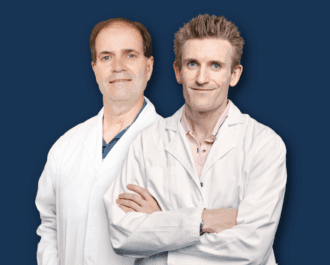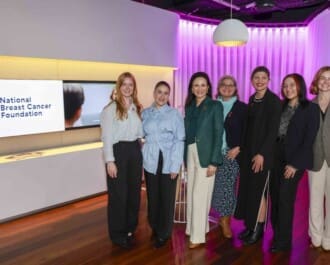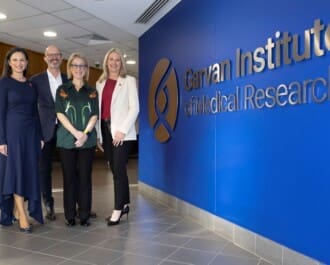
Immunotherapy, which harnesses the body’s immune system to fight against cancer, has become an exciting treatment option in the past few years. One form of immunotherapy, called chimeric antigen receptor T-cell (CAR T) therapy, uses genetically engineered T-cells (a type of immune cell) to selectively target and kill cancer cells. CAR T therapy can allow treatments to be tailored to each patient, an approach known as “personalised medicine”.
While CAR T therapy has been successful in treating some blood cancers, the results have not been as promising in solid tumours such as breast cancer. However, NBCF-funded researcher Dr Paul Beavis (Peter MacCallum Cancer Centre) and his team have found a new way to boost the effectiveness of CAR T immunotherapy. His research was published last month in the prestigious journal Nature Immunology in a study that was co-led by Prof. Phillip Darcy (Peter MacCallum Cancer Centre) .
“One of the major impediments to effective T-cell therapy is that in many cases not all cancer cells within a single tumour look the same. In fact, it is common to have high variability of the target protein recognised by the CAR T cells inside the same tumour, an effect known as heterogeneity,” explained Dr Beavis.
“Engineered CAR T cells are very effective at killing the cancer cells that express the target protein. But, unfortunately, they are not very good at finding cancer cells that lack this target protein.”
The new approach developed by Dr Beavis and his team aims to improve the effectiveness of CAR T by boosting the performance of other immune cells, called dendritic cells (DCs). They have achieved this by engineering special T-cells that increase the number of DCs at the tumour site. Using a breast cancer mouse model, they found that tumour growth was reduced when these engineered T-cells were injected into the mice. When combining this method with other drugs that activate immune cells, tumour growth was further reduced.
These preclinical results will now be investigated in further scientific studies, before hopefully advancing to clinical trials.
“This is an exciting time for cancer immunotherapy,” said Dr Beavis. “Our research shines a light on DCs as an important new component in the next generation of immune-targeting therapies for the treatment of solid cancers. Activating two immune cell types, T-cells and DCs, at the same time can stimulate the body’s immune system to attack multiple cancer targets, helping to overcome the problem of tumour heterogeneity. We hope this will lead to immunotherapies that are far more effective for breast cancer in the future.”
NBCF is proud to provide funding for this study.
More News Articles
View all News


